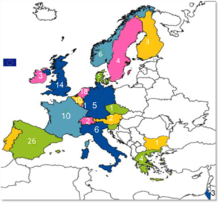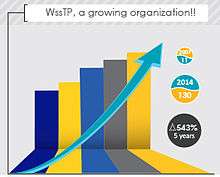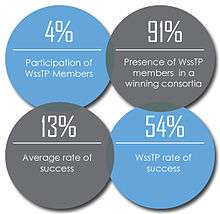WSSTP
WssTP initiation, mission and vision
WssTP is the Water Supply and Sanitation Technology Platform. WssTP was initiated by the European Commission in 2004 for Research and Technology Development in the water industry and was transformed into an independent legal entity under Belgian Law in 2007. WssTP is a membership-based organisation that relies on its members’ contributions to sustain its activities. In 2013, WssTP was reconfirmed as one of the best-performing European Technology Platforms (ETPs) in line with the new ETP2020 strategy. WssTP strives to:
- Improve coordination and collaboration on RTD and Innovation in the water sector
- Enhance the competitiveness of the EU water sector,
- Contribute to solving the EU’s water-related societal challenges
WssTP’s vision is to make the European water sector a leading center of expertise for providing safe, clean and affordable water services while protecting nature by 2030.
‘By 2030 the European water sector will be regarded as the global leader in the provision of safe, clean and affordable water and sanitation.’
Water is by its nature a broad, diverse, and transversal issue that plays a role in very many sectors, research fields, and policy areas. This fragmentation in the water sector is explicitly identified by WssTP as a hurdle to a common research and innovation strategy and this is why WssTP is trying to effectively address it by bringing together the main actors of the water sector and increasing the European scientific and technological cooperation on water.
WssTP members


WssTP is a growing organisation which represents the whole value chain of water with a focus on RTD, innovation, and competitiveness. From 11 members in 2007, WssTP is currently counting 130 members representing multinational corporations, universities and research institutes, utilities (public and private), the supply chain and SMEs, and large industrial and agricultural water users. Representatives from all these members come together in the numerous WssTP activities and working groups. In this framework, WssTP is the ‘spokesperson’ for all these organizations when it comes to liaison with the European Commission, the European Parliament and other European stakeholder organizations.
By joining WssTP, members have immediate access to exclusive services, tailored to meet their needs.
WssTP impact

As the officially recognized European Technology Platform for Water by the EC, WssTP has substantially contributed to the development and improvement of the water sector in Europe through its key activities and its members presence as active players of the water sector. WssTP has played a critical role in the position of water projects on the European Commission’s Research Framework Programme FP7 as well as the participation of its members in the funded projects. Analyzing the figures given by the European Commission, it becomes evident that the funding allocated to water projects has been essentially doubled between 2007 and 2012, while WssTP members’ involvement in FP7 projects has been on a constant rise throughout these years. WssTP members have characteristically participated in a total amount of 186 projects, funded to the tune of 661.032.177 euros.
WssTP members achieved a great success in the FP7-2013 Water Inno-Demo Call that underlines the importance of WssTP as a successful collaborative platform to build projects. Analyses have shown that with only a 4% participation, WssTP members are present in 91% of the winning consortia. Even more important, WssTP members had a success rate of 54% compared to an average success rate of only 13%! WssTP has also acted as an initiating catalyst for many EU projects among them E4Water, TRUST, Prepared, ChemWater and ZELDA and is involved in communication at policy, regulation, strategy and technical detail levels such as: Inputs on the Strategic Implementation Plan for the EIP on water, Barriers to innovation and examples of solutions including the role of standardisation, financing innovation in the European water sector etc.
WssTP Working Groups
| Working Group | Leader |
|---|---|
| Agriculture & Irrigation | IRSA-CNR |
| Bathing Water | KWB |
| Eco-systems Services | Poledream |
| Emerging Compounds | Deltares |
| Finance for Water Competitiveness | Abengoa Water |
| Green Infrastructure | Deltares |
| Managing Hydro-Climatic Extreme Events | CEH |
| Membrane Technologies | EMH |
| Resource Recovery | Wetsus |
| Shales Gas | Veolia |
| Techwatch | KWR |
| Urban Water Pollution | KWR |
| Water Beyond Europe | Unesco-IHE |
| Water Energy Food Biodiversity Nexus | Deltares |
| Water & ICT | Suez Environment |
| Water & Industry | TNO |
WssTP Working Groups are the beating heart of WssTP’s platform, where representatives of its various members collaborate to exchange information and produce long-term research and innovation agendas, roadmaps for action, and other types of publications. WssTP working groups also serve as incubators for project ideas for Horizon2020. Currently WssTP has 16 Working Groups of a strategic, thematic, and technological nature. WssTP Working Groups aim to facilitate amongst others:
- Collaboration and coordination on water-related challenges dealing with RTD&I,
- Improvement of global market opportunities for the European water-related technology, service, and knowledge providers
- Promotion of consortium opportunities
WssTP Working groups can either be initiated by members or as a strategic initiative by the WssTP Board of Directors. Quality and consistency of the working group’s structure and activities are overseen by the WssTP innovation Technology Advisory Board (WssTP iTAB).
WssTP scientific reports
WssTP’s scientific reports aim to put forward clear recommendations for Research and Technology development and Innovation within the European water sector. With minimum of one new publication each year, WssTP has complemented its Water Vision and Strategic Research Agenda by many reports on specific challenges and technologies, describing the state of the art, technological challenges, the barriers to innovations, and making suggestions on how to address these. These reports have served amongst others as input for the definition of the research priorities under the Research Framework Programme (Horizon 2020). All scientific reports are available on WssTP’s website.